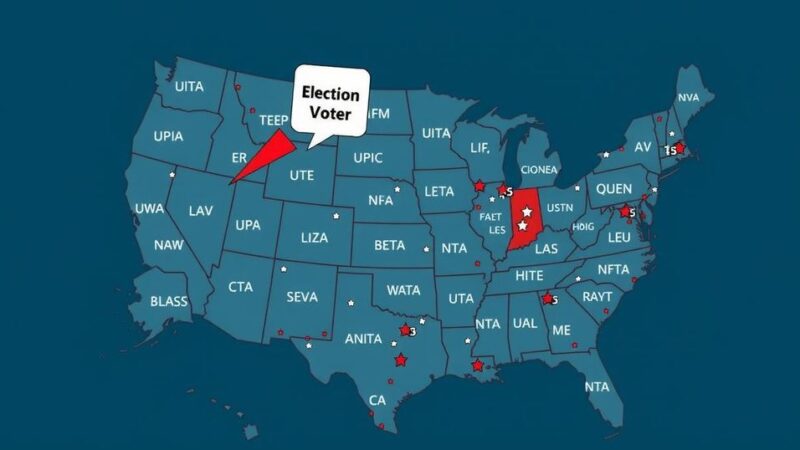Voting has begun in Tunisia’s presidential elections, with President Kais Saied expected to win amid a lack of substantial opposition, as many critics are imprisoned. Approximately 9.7 million voters are eligible, but widespread disinterest and political apathy prevail due to economic hardships and government suppression. The elections signal further consolidation of Saied’s power as Tunisia’s democratic aspirations dwindle.
Polling has commenced in Tunisia’s presidential election amid a political landscape where incumbent President Kais Saied has little to no opposition. With significant critics, particularly key presidential candidates, in prison, the elections appear to be a procedural return to power for Saied, who is expected to win. This election is perceived as the culmination of a period where Tunisia’s aspirations for democracy have increasingly faded since Saied’s consolidation of power in recent years. As of now, the Independent High Authority for Elections (ISIE) reports that approximately 9.7 million citizens are eligible to vote. Polling stations began operations at 8 AM local time and will conclude at 6 PM. Preliminary election results are anticipated by Wednesday, although they may be released earlier. Despite the significant number of registered voters, the practical reality of Saied’s guaranteed reelection, coupled with widespread dissent suppression and ongoing economic struggles, has led to a lack of enthusiasm among voters. In the absence of campaign events or public debates, the portrayal of President Saied predominates in urban environments, resulting in a general atmosphere of apathy towards the voting process. The social sentiment among younger Tunisians is particularly marked. A 22-year-old individual expressed disinterest in participating in the election, underscoring a prevailing perception among his peers that engaging in politics is futile. “We have nothing to do with politics,” he remarked, illustrating the disillusionment that has settled over a populace once hopeful for a thriving democratic future. Tunisia, once celebrated for its role as a catalyst in the Arab Spring, has seen its democratic aspirations stifled since Saied’s assumption of authority in 2021. His actions, including the dissolution of parliament and the systematic eradication of dissent, have drawn both domestic and international scrutiny. According to Human Rights Watch, over 170 individuals are currently imprisoned for political reasons or for the exercise of their basic rights, reflecting a troubling atmosphere regarding civil liberties in the country. High-profile opposition figures, such as Mohamed Ghannouchi of the Ennahdha party, and Abir Moussi of the Free Constitutional Party, are among those incarcerated, contributing to an environment that discourages democratic participation. The International Crisis Group has commented on the growing disinterest from the electorate, attributing it to Saied’s rising nationalism and severe economic issues. Many citizens are fearful that a renewed mandate for Saied will exacerbate their socioeconomic struggles and further entrench authoritarian governance.
The article discusses the current state of political affairs in Tunisia as the nation holds its presidential election. The context reveals a significant deterioration of democratic norms and civil liberties since President Kais Saied’s emergence as a dominant political figure following the 2021 power coup. This situation is compounded by the imprisonment of key opposition figures, which has stifled any real competition in the elections. As Tunisia grapples with economic challenges and growing discontent among the populace, the article paints a grim picture of the electoral process and the public’s perception of its efficacy.
In conclusion, the Tunisian presidential election reflects a deeply entrenched political crisis characterized by the absence of meaningful opposition and widespread public disillusionment. President Kais Saied is poised for reelection, benefitting from a political atmosphere devoid of challenge, where civil liberties are under siege. The reaction of the electorate, particularly the youth’s disengagement, signals a troubling trend for the future of democracy in Tunisia.
Original Source: www.aljazeera.com






